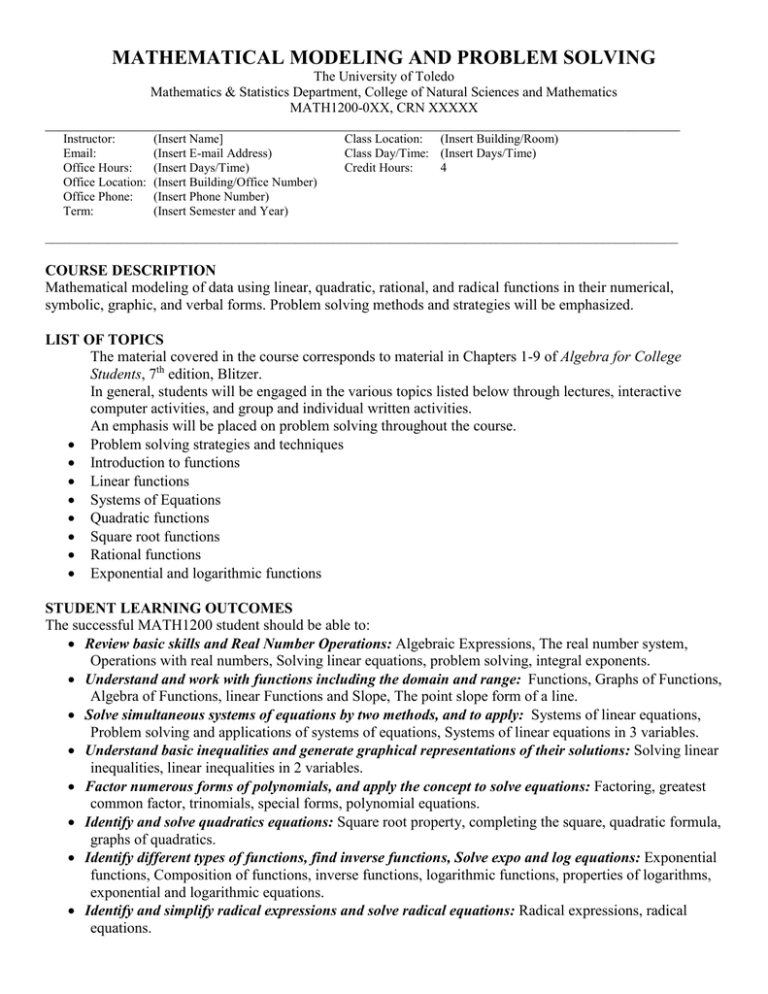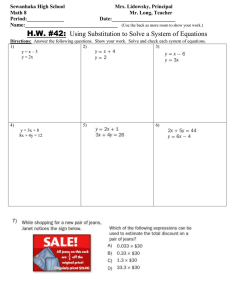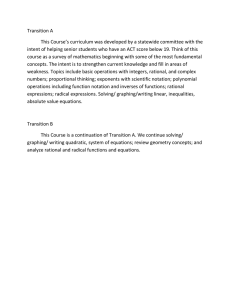
MATHEMATICAL MODELING AND PROBLEM SOLVING
The University of Toledo
Mathematics & Statistics Department, College of Natural Sciences and Mathematics
MATH1200-0XX, CRN XXXXX
____________________________________________________________________________________________
Instructor:
Email:
Office Hours:
Office Location:
Office Phone:
Term:
(Insert Name]
(Insert E-mail Address)
(Insert Days/Time)
(Insert Building/Office Number)
(Insert Phone Number)
(Insert Semester and Year)
Class Location: (Insert Building/Room)
Class Day/Time: (Insert Days/Time)
Credit Hours:
4
_____________________________________________________________________________________________________
COURSE DESCRIPTION
Mathematical modeling of data using linear, quadratic, rational, and radical functions in their numerical,
symbolic, graphic, and verbal forms. Problem solving methods and strategies will be emphasized.
LIST OF TOPICS
The material covered in the course corresponds to material in Chapters 1-9 of Algebra for College
Students, 7th edition, Blitzer.
In general, students will be engaged in the various topics listed below through lectures, interactive
computer activities, and group and individual written activities.
An emphasis will be placed on problem solving throughout the course.
Problem solving strategies and techniques
Introduction to functions
Linear functions
Systems of Equations
Quadratic functions
Square root functions
Rational functions
Exponential and logarithmic functions
STUDENT LEARNING OUTCOMES
The successful MATH1200 student should be able to:
Review basic skills and Real Number Operations: Algebraic Expressions, The real number system,
Operations with real numbers, Solving linear equations, problem solving, integral exponents.
Understand and work with functions including the domain and range: Functions, Graphs of Functions,
Algebra of Functions, linear Functions and Slope, The point slope form of a line.
Solve simultaneous systems of equations by two methods, and to apply: Systems of linear equations,
Problem solving and applications of systems of equations, Systems of linear equations in 3 variables.
Understand basic inequalities and generate graphical representations of their solutions: Solving linear
inequalities, linear inequalities in 2 variables.
Factor numerous forms of polynomials, and apply the concept to solve equations: Factoring, greatest
common factor, trinomials, special forms, polynomial equations.
Identify and solve quadratics equations: Square root property, completing the square, quadratic formula,
graphs of quadratics.
Identify different types of functions, find inverse functions, Solve expo and log equations: Exponential
functions, Composition of functions, inverse functions, logarithmic functions, properties of logarithms,
exponential and logarithmic equations.
Identify and simplify radical expressions and solve radical equations: Radical expressions, radical
equations.
Understand and work with rational expressions: Rational Expressions, Adding and Subtracting Radical
Expressions, Rational Equations, and Applications.
PREREQUISITES
Satisfactory ACT or SAT Math score or satisfactory placement test score. To be successful in this class, you
should be comfortable adding, subtracting, multiplying and dividing signed numbers and fractions, and familiar
with the use of variables.
REQUIRED MATERIALS
The textbook package for Algebra for College Student, A Custom Edition for the University of Toledo
7th edition, Blitzer, Pearson/Prentice Hall, ISBN 9781323157947. The textbook package, which includes
your Access Code, may be purchased at The University of Toledo’s bookstore. Once you have
registered for Math 1200, on the first day of class you will have temporary access to the online course
content. To obtain permanent access, you will need the Access Code.
Scientific calculator (non-graphing, non-programmable). Graphing calculators and cell phones are
not allowed to be used on tests or the final exam.
3-Ring binder/notebook/folder for the organized taking/keeping class notes, and written assignments.
COURSE SYLLABUS & SCHEDULE
Along with this syllabus, a course schedule is posted within your Mylabsplus course at:
Course Tools > Document Sharing > Syllabus and Schedule.
VIDEO LECTURES
Math 1200 will be using a “hybrid flipped” classroom model. This means that much of your required
lectures will be in video format and supplemented by your instructor. You will be required to watch
these lectures as homework, thus allowing more class time for more in-depth, hands-on, group, or
review activities. Additional lectures may be posted on blackboard or within the class site. Each video
lecture is accompanied with a short quiz. You must complete this quiz 75% correctly in-order-to
get into that section’s homework. Reminder: These videos are to be watched before the class
meeting.
UNIVERSITY POLICIES:
POLICY STATEMENT ON NON-DISCRIMINATION ON THE BASIS OF DISABILITY (ADA)
The University is an equal opportunity educational institution. Please read The University's Policy Statement on
Nondiscrimination on the Basis of Disability Americans with Disability Act Compliance.
ACADEMIC ACCOMODATIONS
The University of Toledo is committed to providing equal access to education for all students. If you have a
documented disability or you believe you have a disability and would like information regarding academic
accommodations/adjustments in this course please contact the Student Disability Services Office (Rocket Hall
1820; 419.530.4981; studentdisabilitysvs@utoledo.edu) as soon as possible for more information and/or to
initiate the process for accessing academic accommodations. For the full policy see:
http://www.utoledo.edu/offices/student-disability-services/sam/index.html
ACADEMIC POLICIES:
STUDENT PRIVACY
Federal law and university policy prohibits instructors from discussing a student's grades or class performance
with anyone outside of university faculty/staff without the student's written and signed consent. This includes
parents and spouses. For details, see the “Confidentiality of student records (FERPA)” section of the University
Policy Page at http://www.utoledo.edu/policies/academic/undergraduate/index.html
MISSED CLASS POLICY
If circumstances occur in accordance with “The University of Toledo Missed Class Policy” (found at
http://www.utoledo.edu/facsenate/missed_class_policy.html ) result in a student missing a quiz, test, exam or
other graded item, the student must contact the instructor in advance by phone, e-mail or in person, provide
official documentation to back up his or her absence, and arrange to make up the missed item as soon as
possible.
ACADEMIC DISHONESTY POLICY
Any act of academic dishonesty as defined by the University of Toledo policy on academic dishonesty (found at
http://www.utoledo.edu/dl/students/dishonesty.html) will result in an F in the course or an F on the item in
question, subject to the determination of the instructor.
GRADING POLICY & GRADING SCALE
Assignment Type
Overall % Value
Attendance Quizzes
10%
Written Assignments
10%
Homework
20%
Final Exam
20%
Tests
40%
Grade
A
B
C
D
F
90-92
80-82
70-72
60-62
A-F
93-96
83-86
73-76
63-66
0-59
+
97-100
87-89
77-79
67-69
ATTENDANCE (10%)
Attendance will be taken every class day via online quizzes. Your instructor can consider missing more
than 20% of a class period an absence. Missing 2 or more consecutive classes, or missing every other
day, may lead to the deactivation of your MyLabsPlus account. If your account is deactivated, you will
be unable to access your coursework until you have a conference with your instructor, and/or return to
class. No attendance credit is given for sleeping in class. Leaving class prior to dismissal is grounds to
revoke your attendance for that day.
Attendance Quizzes 1-54 (10%)
Each class day you will have an attendance quiz to take. These are 1-2 question long quizzes.
Many of the questions will also appear on your exams. You must be in class to take these
quizzes. You may miss up to 4 without penalty to account for any excused absences.
WRITTTEN ASSIGNMENTS (10%)
These may be assigned as an individual or group in-class activity, or as an out-of-class assignment.
They can be found at: Course Tools > Document Sharing > Written Assignments. And should be
printed out each Monday they are available. Due dates will be established by your instructor. Makeups
for these assignments may be accessed through the course website. Penalties may be assigned for
late submissions.
Notebooks should be well organized and contain classroom notes, graded written assignments, and
clearly written work associated with homework and quizzes. You may want to include printed copies of
the Lecture Notes that are posted at: Course Tools > Document Sharing > Lecture Notes. Notebooks
will be checked during your final exam, and count as a written assignment
HOMEWORK (20%)
Homework will be assigned each week and due on Monday of the following week. All homework
problems may be worked as often as needed to master the material. Interactive solutions for the
homework problems and different forms of tutorials are available online. Not all homework sets are
equal. Some types are worth more than others:
Skill Check Homework: (<1%)
Preliminary weekly assignment that needs to be completed at least 75% prior to attempting
regular chapter assignments.
Video Lectures: (<1%)
Videos must be watched prior to class discussion. Each homework chapter assignment
has a corresponding video.
Chapter Homework: (3%)
These assignments correspond to the video lectures. You will be tested over this material.
Weekly Mix: (3%)
These assignments are a mix of the material from the current week and prior weeks. All test
questions come from these. They become available each Wednesday.
Practice Tests (1-4,F) (3%)
These will be available a week prior to each test and will be counted as a homework assignment.
All Practice tests will become available the Thursday the previous week, and will be due the
Monday after the test.
Scavenger Hunt Problems (10%)
These are challenging questions with no partial credit. They are available at the start of the
semester. Their due dates are highlighted on the schedule. There is no partial credit for these.
TESTS & FINAL (60%)
There will be 4 semester tests, plus a comprehensive final exam. Tests and final exams can only be
taken in the classroom under the instructor’s supervision or under special circumstances in a Testing
Center, scheduled by the instructor. Only non-graphing, non-programmable calculators may be used
on all tests and the final exam. Cell phones may not be used on all tests and the final exam. Use of a
cell phone in any capacity during a test or the final may result in a grade of 0% for that test or
announced test day, or a grade of 0% may be posted for the missing test. At the end of the
semester, your Final Exam grade may be substituted for your lowest test score. According to The
University of Toledo’s policy, all final exams need to be taken during Final Exam Week.
QUIZZES MISC (0%)
Practice Test 1-4,F: (0%)
To help give you a feel of the test format, these are available 1 week prior to your exam.
-Skills Check Quizzes 1-14: (0%)
Weekly quizzes made available every Thursday. These are required to be completed before
starting your regular weekly homework.
Podcast and Media Use Policy: Media produced by the course instructor are solely for class use by students
currently registered for the course, and under no circumstances can they be posted, linked to, or made available
for distribution or copying to any persons, institutions, or servers (for example, no portion of them may be
downloaded and posted on YouTube or sent to friends). This includes media that appears on the course site and
in VoiceThread. As the author of these teaching materials the instructor or university holds the copyright
(though not to the commercial artworks contained within them), and the only authorized use by students is for
the purposes of the course. Violating this policy constitutes a serious infraction of UT’s computer use policy
and may result in consequences up to and including expulsion from the University and legal action (both
criminal and civil) from the various rights holders whose copyrights you may have infringed.
IMPORTANT DATES
FINAL EXAM: ______________________
The last day to ADD/DROP classes is: _______________
The last day to WITHDRAW from Fall Semester is: _________________
DROP/WITHDRAWAL
Instructors cannot withdraw students from class. Any student who has not withdrawn from class by the
withdrawal deadline will receive a letter grade for this 4 credit hour course. The last day to drop or add this
course is the end of the second week of classes. The last day to withdraw from this class with a grade of “W” is
the Friday of the tenth week of classes.
STUDENT SUPPORT SERVICES
Your instructor is available for extra help during office hours.
Free math tutoring on a walk-in basis is available in the Math Learning and Resources Center located
in Rm B0200 in the lower level of Carlson Library (phone ext 2176). The Center operates on a walk-in
basis. MLRC hours can be found at http://www.math.utoledo.edu/mlrc/MLRC.pdf
Topics to be covered: Learning Objectives covered by that topic follow in italics
Chapter 1, Sections 1-6
Chapter 2, Sections 1-5
Chapter 3, Sections 1-3
Chapter 4, Sections 1, 4
Algebraic Expressions, The real
number system, Operations with real
numbers, Solving linear equations,
problem solving, integral exponents.
Review of basic skills and Real
Number Operations
Functions, Graphs of Functions, linear
Functions and Slope, The point slope
form of a line. Understand and work
with functions including the domain
and range.
Systems of linear equations, Problem
solving and applications of systems of
equations, Systems of linear equations
in 3 variables. Solve simultaneous
systems of equations by two methods,
and to apply.
Solving linear inequalities, linear
inequalities in 2 variables.
8 hours
6 hours
4 hours
3 hours
Understand basic inequalities and
generate graphical representations
of their solutions
Chapter 5, Sections 3-7
Chapter 8, Sections 1-3
Chapter 7, Sections 1, 6
Factoring, greatest common factor,
trinomials, special forms, polynomial
equations. Factor numerous forms of
polynomials, and apply the concept to
solve equations.
Square root property, completing the
square, quadratic formula, graphs of
quadratics. Identify and solve
quadratics equations.
Radical expressions, radical equations.
Identify and simplify radical
expressions and solve radical
equations.
5 hours
7 hours
3 hours
Chapter 6, Sections 1, 2, 6, 7
Chapter 9, Sections 1-5
Rational Expressions, Adding and
Subtracting Radical Expressions,
Rational Equations, and Applications.
Understand and work with rational
expressions.
Exponential functions, Composition of
functions, logarithmic functions,
exponential and logarithmic equations.
Identify different types of functions,
Solve expo and log equations.
5 hours
5 hours



